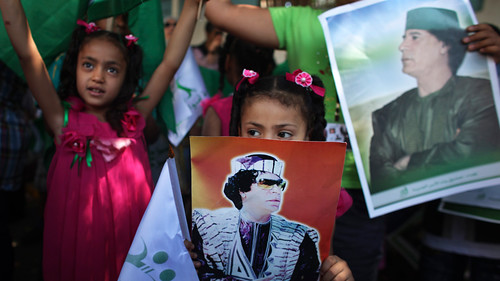
Libyans rally in support of the government which was overthrown by US/NATO military forces and their allies inside the North African state. The State Department contiues to strangle the country., a photo by Pan-African News Wire File Photos on Flickr.
June 22, 2012, 7:41 p.m. EDT
Libya Election Panel Battles Ghosts
By MARGARET COKER
Wall Street Journal
TRIPOLI—Libya's interim authorities, eager to avoid the political chaos of neighboring Egypt, are going to great lengths to keep people associated with the former regime from regaining power.
A vetting panel called the Commission for Integrity and Patriotism has scrutinized the approximately 4,000 candidates vying in Libya's first post-Gadhafi election, which is scheduled for July 7. The goal: find and block those with ties to Moammar Gadhafi and his family or considered traitors to the revolution that overthrew him.
Workers at a Tripoli design house prepare election posters on Tuesday, a day into the campaign season.
At the start of campaigning this week, the panel said it had rejected 320 would-be candidates from taking part in the July poll, while the election commission disqualified 650 others—a significant share of those who sought to run for office.
Now, some 2500 people will contest 120 seats reserved for individual candidates, while over 100 parties will compete for the remaining 80 seats in a 200-body parliamentary body that will have full control over national security, foreign affairs and Libya's oil wealth.
In contrast to Egypt, which is now ruled by its ousted president's military and could see one of his colleagues succeed him, Libya's leaders—all top opposition figures—have marshaled a full-scale campaign to dismantle the country's authoritarian system and lay a new political foundation.
An umbrella coalition of liberal parties led by Mahmoud Jibril, the head of the rebel government that received Western support for efforts to overthrow the Gadhafi regime. Mr. Jibril isn't on the list of candidates.
.Their most pressing national-security concern has been to keep those affiliated with Gadhafi out of public life—though human-rights groups have criticized many policies for violating the rule of law, such as the indefinite imprisonment by revolutionary militias of hundreds of people accused of being Gadhafi loyalists.
Libyans have jumped at the chance to participate in their first multiparty election since Gadhafi took over in 1969. Many voters say they hope the new governing body will solve the growing lawlessness that has been the hallmark of life in Libya over the past several months.
Approximately 2.7 million Libyans signed up to vote—80% of eligible voters, according to statistics released by the national electoral commission.
The 200-seat assembly will establish a new constitution and political road map after decades of one-man rule. It will also run the country until the new constitution is approved by a national referendum.
Libya's monthslong, internationally supported military campaign to oust Gadhafi left smoldering anger and suspicion toward those who prospered under his 40-year regime. That has added widespread public support for the work of the Commission for Integrity and Patriotism, despite the lack of transparency about the standards it used in its decisions.
Neither the commission nor the election commission explained the reasons for its decisions about disqualification of particular candidates. They didn't respond to emails requesting comment.
The multistage vetting system was established as part of an arduous electoral law passed this spring. Those prohibited from standing for the election include officials who held upper-level governmental positions under Gadhafi, worked for charity organizations affiliated with his family, or had their education paid for by Gadhafi's government. People with commercial ties to Gadhafi's family or stole public funds are also barred from office.
According to election officials, candidates had to submit to a criminal-background check conducted by the new Interior Ministry and a separate check by the Defense Ministry to ensure that candidates aren't members of the country's new security or military bodies. The vetting committee also assessed the financial, educational and political backgrounds of each candidate.
It remains unclear what burden of proof the committee used to determine guilt. Since the revolution last year, Libya's courts haven't yet convicted any Gadhafi-era official of any crimes.
Members of the vetting commission encouraged citizens to submit complaints about potential candidates, lending a sometimes informal quality to the process.
On a sunny morning in May, a middle-age, mustachioed man from the Sharqiyah neighborhood of Tripoli arrived at the district electoral center to register as a candidate. As he filled out his paperwork, the din-filled room fell silent while word spread that he resembled a Gadhafi-era functionary.
The head of candidate registration called the integrity commission after the man finished and left. "Put an asterisk by his name so we know to put him at the top of our list," the commission member said, according to an official who overheard the conversation. Members of the integrity commission didn't respond to requests to comment.
Write to Margaret Coker at margaret.coker@wsj.com
No comments:
Post a Comment